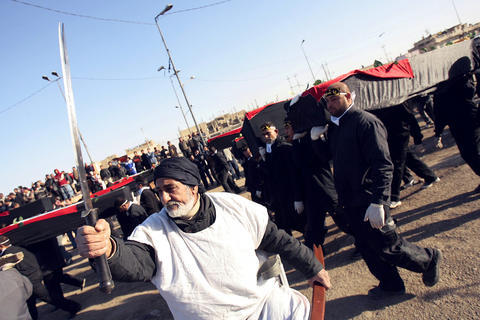Anti-US cleric Moqtada al-Sadr announced yesterday that he has extended a ceasefire order to his Shiite Mahdi Army by another six months, giving Iraq a chance to continue its fragile recovery from brutal sectarian violence.
His message was delivered by Shiite clerics during prayer services in mosques dominated by followers of the black-turbaned cleric.
"According to an order by Sayyid Moqtada, activities of the Mahdi Army will be suspended ... for another six month period," al-Sadr's aide Hazim al-Aaraji said, using an honorific during his sermon at the Kazimiyah mosque in Baghdad.

PHOTO: AFP
Al-Sadr's decision to halt the activities of his powerful militia for up to six months last August was one of three critical steps that have been widely credited with bringing the Iraqi death toll down more than 60 percent in recent months. The other pieces of the puzzle are the surge of US troops and the move by US-backed Sunni fighters to switch allegiances and start working against al-Qaeda in Iraq.
The US military welcomed initial word of the decision, but pledged to continue cracking down on what it calls breakaway factions that persist in violence.
"This extension of his August 2007 pledge of honor to halt attacks is an important commitment that can broadly contribute to further improvements in security for all Iraqi citizens," the military said in a statement. "It will also foster a better opportunity for national reconciliation and allow the coalition and Iraqi security forces to focus more intensively on al-Qaeda terrorists."
"Those who continue to honor al-Sayyid Moqtada al-Sadr's pledge will be treated with respect and restraint," it said. "Coalition and Iraqi security forces will continue to work closely with the Iraqi people to protect them from these criminals who violate the law and dishonor the commitment made by al-Sayyid Moqtada."
The military also said it was open to dialogue with the Sadrists and "all groups who seek to bring about reconciliation in building the new Iraq."
The US military has continued to raid Shiite groups it says are supported and trained by Iran and have splintered off from al-Sadr's militia. That's angered some followers of Sadr, who also are frustrated with the Iraqi government, and they argued for an end to the ceasefire.
Al-Sadr's surprise decision last year to stand down his Mahdi Army for up to six months was designed to stop a Shiite-Shiite rift from spiraling out of control and to weed out infiltrators in his militia's ranks, according to aides of the radical Shiite cleric.
Al-Sadr issued his order to his fighters to stand down for up to six months on Aug. 29 last year, days after deadly clashes in the holy city of Karbala between his Mahdi Army and the rival Badr militia of the Supreme Iraqi Islamic Council, the country's largest Shiite party and a US partner.

NO EXCUSES: Marcos said his administration was acting on voters’ demands, but an academic said the move was emotionally motivated after a poor midterm showing Philippine President Ferdinand Marcos Jr yesterday sought the resignation of all his Cabinet secretaries, in a move seen as an attempt to reset the political agenda and assert his authority over the second half of his single six-year term. The order came after the president’s allies failed to win a majority of Senate seats contested in the 12 polls on Monday last week, leaving Marcos facing a divided political and legislative landscape that could thwart his attempts to have an ally succeed him in 2028. “He’s talking to the people, trying to salvage whatever political capital he has left. I think it’s

Polish presidential candidates offered different visions of Poland and its relations with Ukraine in a televised debate ahead of next week’s run-off, which remains on a knife-edge. During a head-to-head debate lasting two hours, centrist Warsaw Mayor Rafal Trzaskowski, from Polish Prime Minister Donald Tusk’s governing pro-European coalition, faced the Eurosceptic historian Karol Nawrocki, backed by the right-wing populist Law and Justice party (PiS). The two candidates, who qualified for the second round after coming in the top two places in the first vote on Sunday last week, clashed over Poland’s relations with Ukraine, EU policy and the track records of their

UNSCHEDULED VISIT: ‘It’s a very bulky new neighbor, but it will soon go away,’ said Johan Helberg of the 135m container ship that run aground near his house A man in Norway awoke early on Thursday to discover a huge container ship had run aground a stone’s throw from his fjord-side house — and he had slept through the commotion. For an as-yet unknown reason, the 135m NCL Salten sailed up onto shore just meters from Johan Helberg’s house in a fjord near Trondheim in central Norway. Helberg only discovered the unexpected visitor when a panicked neighbor who had rung his doorbell repeatedly to no avail gave up and called him on the phone. “The doorbell rang at a time of day when I don’t like to open,” Helberg told television

‘A THREAT’: Guyanese President Irfan Ali called on Venezuela to follow international court rulings over the region, whose border Guyana says was ratified back in 1899 Misael Zapara said he would vote in Venezuela’s first elections yesterday for the territory of Essequibo, despite living more than 100km away from the oil-rich Guyana-administered region. Both countries lay claim to Essequibo, which makes up two-thirds of Guyana’s territory and is home to 125,000 of its 800,000 citizens. Guyana has administered the region for decades. The centuries-old dispute has intensified since ExxonMobil discovered massive offshore oil deposits a decade ago, giving Guyana the largest crude oil reserves per capita in the world. Venezuela would elect a governor, eight National Assembly deputies and regional councilors in a newly created constituency for the 160,000